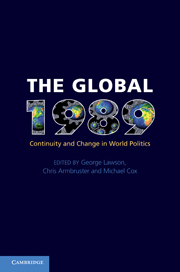Book contents
Introduction: the ‘what’, ‘when’ and ‘where’ of the global 1989
Published online by Cambridge University Press: 05 June 2012
Summary
Laughter and forgetting
One of the central motifs of Milan Kundera's The Book of Laughter and Forgetting (1980) is the ways in which the present works to distort the past and, in particular, how ideologues seek to control the present by manipulating the past. To that end, Kundera tells the story of a photograph taken of two leading Czech communists, Vladimír Clementis and Klement Gottwald, celebrating the takeover of state power by communists in Czechoslovakia in 1948. The picture was later doctored to remove Clementis, following charges brought against him for ‘deviationism’ and ‘bourgeois nationalism’. The erasure of Clementis from the photograph temporarily removed one of the leading architects of the Czech post-war state from the country's history. Clementis was denounced, put on trial and, eventually, executed. In some ways, of course, the very everydayness of this episode is its most disturbing aspect. The routinisation of coercion within totalitarian states – the use of murder and imprisonment, the control of populations via vast coercive apparatuses, the establishment of insidious networks of corruption – was the norm rather than the exception. As such, the events of 1989 and the disappearance of what Daniel Chirot (1996) calls ‘tyrannies of certitude’ from most parts of Central and Eastern Europe are acts well worth celebrating.
Alongside the pronounced celebrations which marked the passing of state socialism in 1989 lies a second widely held view – that 1989 serves the ur-demarcation point in contemporary world politics.
- Type
- Chapter
- Information
- The Global 1989Continuity and Change in World Politics, pp. 1 - 20Publisher: Cambridge University PressPrint publication year: 2010
- 2
- Cited by



